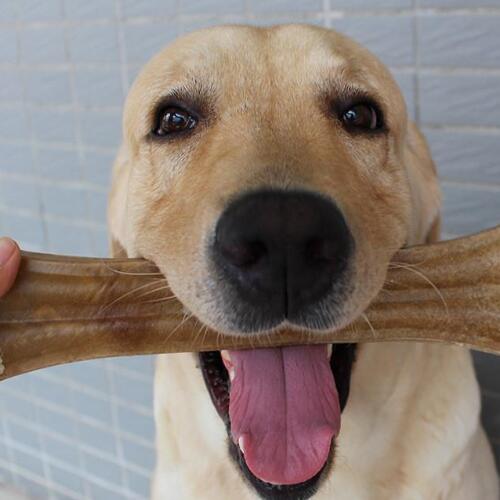邮箱:dochews@163.com
手机:15100180409
电话:15100180409
地址:YY-053 NO.28 OF SHUICHANGIAN ROAD NINGYUAN ROAD HEBEI DISTRICT TIANJIN CHINA
Nutritional composition of dog food

1. Carbohydrates
Carbohydrates are the main source of energy for pets. In order to ensure their physical survival, health, development, reproduction, heart beating, blood circulation, gastrointestinal peristalsis, muscle contraction and other activities, pets need a lot of energy, and 80% of these required energy is provided by carbohydrates. Carbohydrates include sugar and fiber.
The daily carbohydrate requirement of adult dogs is 10 grams per kilogram of body weight, and that of puppies is about 15.8 grams per kilogram of body weight.
2. Protein
Protein is an important source of pet body tissue and somatic cells. Protein plays a variety of functions, such as conduction, transportation, support, protection, exercise and so on. Protein also plays a catalytic and regulatory role in pet life and physiological metabolic activities, and plays a major role in maintaining life activities.
As a carnivore, pet dogs have different digestibility of protein in different feed materials. The digestibility of most animal viscera and fresh meat is 90-95%, while the protein in plant feed such as soybean can only digest 60-80%. If dog food contains too much indigestible plant protein, it will cause abdominal pain and even diarrhea; Moreover, too much protein needs to be degraded by the liver and excreted by the kidney, which will increase the burden on the liver and kidney. Generally, the protein requirement of adult dogs is 4-8 grams per kilogram of body weight per day, and that of growing dogs is 9.6 grams.
3. Fat
Fat is an important component of pet body tissue, which is involved in almost all cell composition and repair. It contains fat in pet skin, bone, muscle, nerve, blood and internal organs. The proportion of fat in pet dogs is as high as 10 ~ 20% of their body weight;
Fat is the most important source of energy. Lack of fat will make the skin itchy, dandruff increase, rough and dry fur and ear infection, making the dog dull and neurotic; Proper intake of fat can stimulate appetite, make food more in line with their taste, and promote the absorption of fat soluble vitamins A, D, e and K. The digestibility of fat in pet dogs is almost 100%. The fat requirement of adult dogs is 1.2g per kilogram of body weight per day, and that of growing dogs is 2.2g.
4. Minerals
Minerals are another kind of indispensable nutrients for pet dogs. They include elements needed by human body, such as calcium, phosphorus, zinc, copper, magnesium, potassium, iron and so on. Minerals are an important raw material for the collective organization of pet dogs. They help regulate the acid-base balance, muscle contraction, nerve reaction and so on.
The most common deficiency of pet dogs is calcium and phosphorus. Deficiency can lead to many bone diseases, such as rickets, chondropathy (puppies), osteoporosis (adult dogs), paralysis of postpartum bitches, etc. The imbalance of calcium and phosphorus ratio can also lead to leg disease (lameness, etc.).
General pet feed is short of sodium and chlorine, so a small amount of salt (electrolyte, potassium, sodium and chlorine trace elements must be added to dog food. Iron deficiency will lead to anemia; zinc deficiency will lead to poor fur development and dermatitis; manganese deficiency, poor bone development and thick legs; selenium deficiency and muscle weakness; iodine deficiency will affect the synthesis of thyroxine.
5. Vitamins
Vitamin is a low molecular organic compound that is necessary for pet physical metabolism and requires very little. It can not be synthesized in the body. It mainly depends on pet food dog food. Except for some vitamins, most of them are required to be added in dog food. They do not provide energy, nor are they the structural components of the body, but they are absolutely indispensable in the diet. For example, a long-term lack or deficiency of a certain vitamin can cause metabolic disorder and pathological state to form vitamin deficiency.
Fat soluble vitamins: vitamins A, D, e, K, B vitamins (B1, B2, B6, B12, niacin, pantothenic acid, folic acid, biotin, choline) and vitamin C.
Don't worry about excess B vitamins (excess B vitamins will be excreted). Because domestic dogs don't eat a lot of fruits, vegetables and grains like people, they are lack of B vitamins.
Vitamin E plays a significant role in nutrition and beauty. Because vitamins are easily damaged by sunlight, heating and air humidity, vitamins should be fully added to dog food.
6. Water
Water: water is an important condition for the survival of human and animals (including all organisms). Water can transport various substances necessary for life and eliminate unnecessary metabolites in the body; Promote all chemical reactions in the body; Regulate body temperature by releasing a large amount of heat through unconscious water evaporation and sweat secretion; Joint synovial fluid, respiratory tract and gastrointestinal mucus have good lubricating effect. Tears can prevent dry eyes, and saliva is conducive to moist pharynx and swallowing food.
- 上一篇:Dog food
- 下一篇:暂无